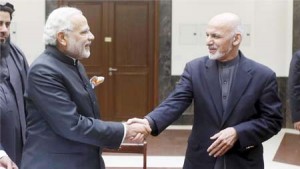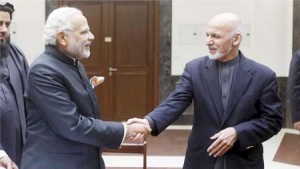Al Jazeera
Rupakjyoti Borah
- New Delhi will have to stay the course in Afghanistan in the light of its long-term interests
 As the snow melts in Afghanistan, it is not only the temperatures that rise. So too does the number of attacks as terrorists sneak in through the rugged Afghanistan-Pakistan border region. The recent attack of March 2 on the Indian consulate in the Afghan city of Jalalabad bears all the hallmarks of similar attacks carried out earlier on Indian missions in Afghanistan.
As the snow melts in Afghanistan, it is not only the temperatures that rise. So too does the number of attacks as terrorists sneak in through the rugged Afghanistan-Pakistan border region. The recent attack of March 2 on the Indian consulate in the Afghan city of Jalalabad bears all the hallmarks of similar attacks carried out earlier on Indian missions in Afghanistan.
New Delhi is one of the biggest international donors in Afghanistan and has committed development assistance to the tune of $2bn to Kabul. This, among other things, has raised the hackles of anti-India elements in Afghanistan and beyond, and led to repeated attacks on Indians and Indian interests in Afghanistan.
On the eve of the inauguration of the current Indian Prime Minister Narendra Modi in May 2014, the Indian consulate in Herat was attacked. The Indian consulate in Mazar-e-Sharif was hit earlier this year in January. And the Indian Embassy in Kabul had been attacked in 2008 and 2009 with many casualties (including Indian Embassy staffers) – while its consulate in Jalalabad had been targeted earlier too, this being the fourth attack since 2007.
However, all these attacks have not prevented India from continuing to press forward in Afghanistan.
Critical conduit for India
Afghanistan is India’s gateway to energy-rich Central Asia. For the continued growth of the Indian economy, a constant supply of energy is essential, and since Pakistan does not allow overland access to Indian goods destined for Central Asia, Afghanistan is a crucial conduit for India.
Moreover, last December, India, Pakistan, Afghanistan and Turkmenistan signed an agreement that will see natural gas being pumped from Turkmenistan to Afghanistan, Pakistan and India through the Turkmenistan-Afghanistan-Pakistan-India (TAPI) pipeline, scheduled to go into operation by December 2019.
India has deep economic interests in Afghanistan too. A consortium of Indian companies won the rights to three iron ore mines in the Hajigak region of Afghanistan back in 2011.
India’s influence in Afghanistan has been on the wane, especially after the former president, the India-educated Hamid Karzai left office. It now faces a Hobson’s choice in Afghanistan. On one hand, it can expect regular attacks on Indian interests, while on the other hand it cannot afford to pull out of that country. In such a quagmire, what can New Delhi do?
One thing that will not harm New Delhi’s interests is to keep talking with Pakistan, as Islamabad retains a huge degree of influence in Afghanistan. Many of the terror outfits that operate in Afghanistan find shelter in Pakistan and in return, Pakistan gains a so-called strategic depth in Afghanistan.
New Delhi will have to step up security cooperation with the United States and other countries, which have also borne the brunt of terrorist attacks in Afghanistan. In addition, intelligence gathering and sharing will be key if India is to take on the monster of terrorism in Afghanistan.
Opportunities and threats
In a sign of India’s continuing commitment to Afghanistan, Modi paid a visit to Afghanistan on December 25 of the last year where he inaugurated the new Afghan parliament built by India.
In addition, New Delhi has constructed a 218km road in Afghanistan from Delaram to Zaranj on the Iranian border, which will help in transporting Afghan exports to various countries via the sea route. India has been involved in the development of the Chabahar port in Iran, and Indian goods can be transported to Afghanistan via Iran.
India would also do well to keep a channel of communication open with the Taliban. When other countries have shown a willingness to talk to the so-called “good Taliban”, realpolitik dictates that India should also keep its mind – and options – open. Keeping a channel of communication open with the so-called “good Taliban” is a low-hanging fruit that India should immediately pluck.
New Delhi will also have to do some out-of-the-box thinking, and it may be worth sounding out Beijing for possible opportunities for cooperation in Afghanistan.
Beijing’s outlying border province of Xinjiang and India’s border province of Jammu and Kashmir could suffer in any further deterioration of the security situation in Afghanistan because these provinces abut Afghanistan.
India will also need to beef up its security presence in Afghanistan and bolster the Afghan armed forces. For the first time in December last year, India gifted Mi-25 attack helicopters to the Afghan forces.
New Delhi is caught between a rock and a hard place in Afghanistan. Since, reducing its footprint in Afghanistan is not an option for New Delhi, India and Indians will have to be prepared for more such terror attacks and be ready to brazen them out – while strengthening security at its missions, and its intelligence gathering and sharing mechanism.
In this regard, New Delhi could learn from former Chinese leader Deng Xiaoping’s maxim: “Hide your strengths, bide your time”.



